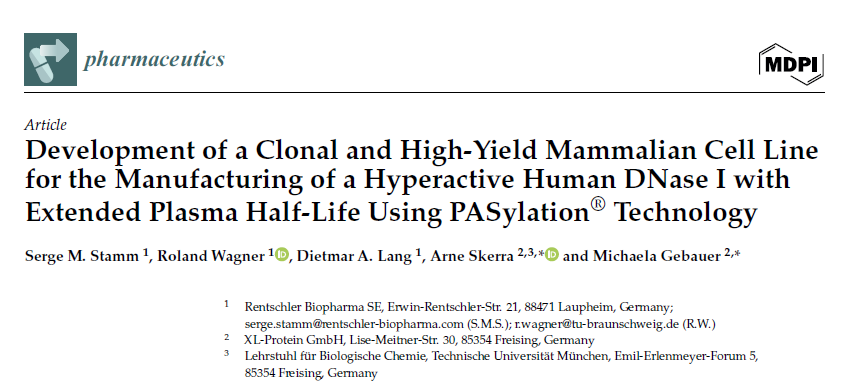
Cumulative evidence from several pre-clinical studies suggests that restoration of plasma DNase activity in a thrombo-inflammatory state may improve clinical outcomes. Following injury, hyperactivated immune cells release large amounts of granular proteins together with DNA, which often accumulate in the surrounding environment in so-called neutrophil extracellular traps (NETs). Degradation of excess NETs by systemic DNase administration offers a promising therapeutic approach to ameliorate inflammation and dissolve intravascular clots.
In this paper, published in the 15th Anniversary edition of Pharmaceutics and the Special Issue “Improvement of Drug Bioavailability”, Serge M. Stamm, Director Downstream Manufacturing at Rentschler Biopharma SE, and Michaela Gebauer, Managing Director of XL-protein GmbH, demonstrate that the bioavailability of exogenous DNase in the body can be significantly enhanced by engineering the physical size and the active site of this therapeutic enzyme. Compared to the natural DNase I, whose recombinant form is approved for the inhaled therapy of cystic fibrosis, the improved variant fused with the PAS-biopolymer shows a much higher hydrolytic activity towards DNA and has a considerably prolonged pharmacokinetic profile after a single intravenous dose in a preclinical animal model.
The research is part of Rentschler Biopharma’s collaboration with XL-protein GmbH to manufacture a long-acting, hyperactive recombinant human deoxyribonuclease I (DNase I). Combining XL-protein’s proprietary PASylation® technology and Rentschler Biopharma’s expertise in bioprocess development, a process was developed with highyield for this modified DNase I.